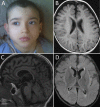GRIN2A mutation and early-onset epileptic encephalopathy: personalized therapy with memantine
- PMID: 24839611
- PMCID: PMC4019449
- DOI: 10.1002/acn3.39
GRIN2A mutation and early-onset epileptic encephalopathy: personalized therapy with memantine
Abstract
Objective: Early-onset epileptic encephalopathies have been associated with de novo mutations of numerous ion channel genes. We employed techniques of modern translational medicine to identify a disease-causing mutation, analyze its altered behavior, and screen for therapeutic compounds to treat the proband.
Methods: Three modern translational medicine tools were utilized: 1) high-throughput sequencing technology to identify a novel de novo mutation; 2) in vitro expression and electrophysiology assays to confirm the variant protein's dysfunction; and 3) screening of existing drug libraries to identify potential therapeutic compounds.
Results: A de novo GRIN2A missense mutation (c.2434C>A; p.L812M) increased the charge transfer mediated by NMDA receptors containing the mutant GluN2A-L812M subunit. In vitro analysis with NMDA receptor blockers indicated that GLuN2A-L812M-containing NMDARs retained their sensitivity to the use-dependent channel blocker memantine; while screening of a previously reported GRIN2A mutation (N615K) with these compounds produced contrasting results. Consistent with these data, adjunct memantine therapy reduced our proband's seizure burden.
Interpretation: This case exemplifies the potential for personalized genomics and therapeutics to be utilized for the early diagnosis and treatment of infantile-onset neurological disease.
Figures




References
-
- Reutlinger C, Helbig I, Gawelczyk B, et al. Deletions in 16p13 including GRIN2A in patients with intellectual disability, various dysmorphic features, and seizure disorders of the rolandic region. Epilepsia. 2010;51:1870–1873. - PubMed
-
- Endele S, Rosenberger G, Geider K, et al. Mutations in GRIN2A and GRIN2B encoding regulatory subunits of NMDA receptors cause variable neurodevelopmental phenotypes. Nat Genet. 2010;42:1021–1026. - PubMed
-
- de Ligt J, Willemsen MH, van Bon BW, et al. Diagnostic exome sequencing in persons with severe intellectual disability. N Engl J Med. 2012;20:1921–1929. - PubMed
Grants and funding
LinkOut - more resources
Full Text Sources
Other Literature Sources
Miscellaneous

